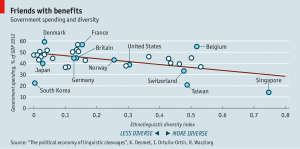“…although individuals may feel antagonism towards other groups in society, that prejudice is less strong if they interact with these groups in their daily lives.” — Desmet, Gomes and Ortuño-Ortín
Quartz internet news magazine covered the research of SMU Economics Professor Klaus Desmet and colleagues. The article reported that the new study by Desmet and two other economists found that after examining data from nearly every country in the world, they find that when diverse groups interact, it leads to better outcomes in terms of health, education and public infrastructure.
“Chalk one up for contact theory,” wrote San Francisco-based reporter Dan Kopf, who covers economics and markets and has a Masters in Economics from the London School of Economics.
Desmet, who has his degree from Stanford University, is Ruth and Kenneth Altshuler Centennial Interdisciplinary Professor. His research interests include international trade, regional and urban economics, macroeconomics and political economy.
Desmet’s work is likely to be of profound significance for actual policy makers, according to Santanu Roy, University Distinguished Professor and Chair of the SMU Department of Economics.
“Klaus Desmet is engaged in truly path breaking research in undestanding the spatial, cultural and genetic dimensions of the global economy and the deep long run determinants of economic change,” said Roy. “Over the last few years, his work has been published in the very top journals in economics such as the American Economic Review and the Journal of Political Economy, a major boost to the reputation and visibility of the SMU economics department.”
The Quartz article, “When diverse groups interact, everybody ends up smarter and healthier,” published March 24, 2017.
EXCERPT:
By Dan Kopf
Quartz
A striking fact about the tide of nationalism sweeping through the West is that it is strongest in places with the least diversity. Supporters of Donald Trump, and his “America first” policies, generally come from areas of the US least touched by immigration. The parts of the UK that opted to “take back control” by voting for Brexit also clustered in areas with fewer foreign-born residents.But as a group of economists note, “although individuals may feel antagonism towards other groups in society, that prejudice is less strong if they interact with these groups in their daily lives.”
In recently released research (pdf), Klaus Desmet, Joseph Gomes, and Ignacio Ortuño-Ortín go well beyond examining the demographics of Trump and Brexit voters. Their research explores whether contact theory, the belief that increased interaction leads to better relations between groups, or conflict theory, that interaction leads to more prejudice, is a better way to describe the current state of the world. They examined data from nearly every country in the world, and find that when diverse groups interact, it leads to better outcomes in terms of health, education, and public infrastructure. Chalk one up for contact theory.
A vast body of earlier research has found, however, that ethnic and linguistic diversity tends to reduce spending on public goods. This is usually explained as a preference not to share with people perceived to be different. For example, Sweden’s high government spending versus the US might be down to Sweden’s relative lack of diversity.
This suggests that diversity is not helpful if groups mainly keep to themselves. To test this assumption, Desmet, Gomes, and Ortuño-Ortín divided the world into a grid of five-square-kilometer cells and estimated the number of people who speak different languages in each. Using this data and country-level estimates of diversity, the researchers calculated two numbers:
1) Country diversity: The probability that within a country two randomly chosen people speak the same language. A higher score means greater diversity in languages spoken.






 Department of Defense awards $2.6 million to SMU STEM program for minority students
Department of Defense awards $2.6 million to SMU STEM program for minority students
 Observed by Texas telescope: Light from huge explosion 12 billion years ago reaches Earth
Observed by Texas telescope: Light from huge explosion 12 billion years ago reaches Earth